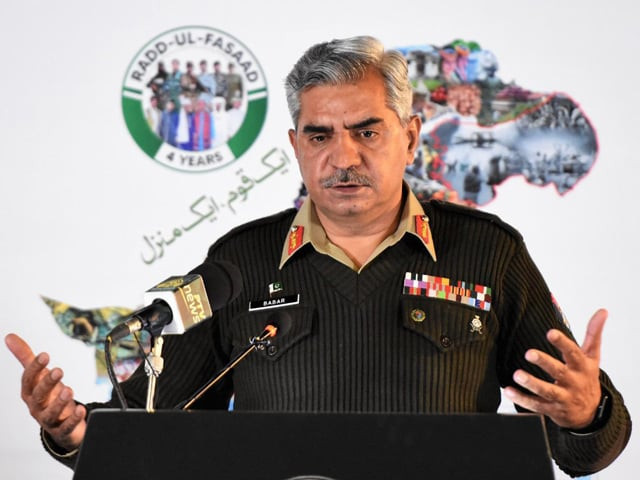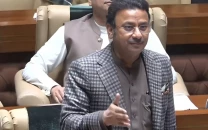Army dismisses speculations on DG ISI’s replacement
ISPR spokesperson clarifies Lt Gen Faiz will complete his two-year tenure

The chief military spokesperson on Monday dismissed speculations that the head of Inter-Services Intelligence (ISI) was being replaced, saying there was no truth to such “baseless rumours”.
“There is no truth to such speculations. These are baseless speculations,” Major General Babar Iftikhar, Director General Inter-Services Public Relations (ISPR) replied here at a news conference when asked to comment on reports on social media that Lt Gen Faiz Hameed was being replaced by Lt Gen Asif Ghafoor.
The DG ISPR clarified that the appointments in the army at a senior level were not “short lived” and usually the head of an institution’s tenure lasted two years.
Speculations were doing the rounds on social media that the current DG ISI would soon be replaced. The name of Lt Gen Asif, the former DG ISPR, was mentioned as his possible successor.
The DG ISI is considered one of the most important positions in the military establishment.
Gen Faiz was appointed DG ISI in June 2019.
As the DG ISPR clarified that usually the tenure of ISI chief would last for two years, it is clear that the current DG ISI would remain at the helm at least until June.
Although, the DG ISI comes from the army, theoretically he is answerable to the prime minister, who also has the authority to approve his appointment.
Also read: Pakistan Army conducts tactical drills in Thar Desert
The clarification from the DG ISPR also indicated that the premier and the military leadership were keen to retain the current head of ISI in the middle of internal and external challenges, particularly the Afghan peace efforts.
To a question, the DG ISPR sounded optimistic about the outcome of the Afghan peace efforts despite the decision of the Biden administration to review the February, 29, 2020 deal.
“These are all the more reasons to be optimistic [about the Afghan peace process],” Gen Babar said, adding that Pakistan would continue to facilitate the process.
He, however, made it clear that ultimately it was the people of Afghanistan and their government had to take the decision about the future of their country.
“We are clear that Pakistan’s peace is intertwined with peace in Afghanistan,” he added.
Earlier, the chief military spokesperson gave an overview of the progress achieved in the war against terrorism on the 4th anniversary of operation Radd-ul-Fasaad.
The operation Radd-ul-Fasaad was launched under the leadership of army chief General Qamar Javed Bajwa on February 22, 2017, according to Gen Babar.
“The operation Radd-ul-Fasaad has a two-pronged strategy that includes countering terrorism and countering violent extremism,” he explained.
DG ISPR Press Conference - 22nd Feb 2021 https://t.co/ADzc4r9HWb
— DG ISPR (@OfficialDGISPR) February 22, 2021
He said the operation was launched to go after terrorists and groups who found refuge in other parts of the country after they were driven out of the erstwhile tribal areas.
Under the Radd-ul-Fasaad operation, as many as 750,000 intelligence based operations (IBOs) were carried out throughout the country. In those operations, the country’s intelligence agencies including the ISI, the MI, the IB as well as the police and other law enforcement agencies took part.
The IBO helped neutralise many terrorists and their supporters, Gen Babar told reporters.
“Pakistan’s grand strategy to counter terrorism includes clear, hold, build and transfer,” he said. “The clear and hold phase was from 2010 to 2017.”
He said from 2017 onwards the focus was on build and transfer. This would mean holding the “hard-earned gains” in the war against terrorism in order to enable the civilian administration to take over those areas.
Also read: Minister hails improved ranking of Pak Army
When his attention was drawn to the killing of four NGO women workers in North Waziristan, the chief military spokesperson said every incident should not be taken as a terrorist attack. “There can be law and order problems. We should not be incident specific in terms of discussing these challenges,” he stressed. “These incidents would not come down to zero,” he explained, insisting it would take time to bring complete normalcy in the erstwhile tribal areas.
He listed the number of achievements under the Radd-ul-Fasaad operation. On countering the violent extremism, he mentioned madrassa and police reforms as well as merger of the erstwhile Federally Administrated Tribal areas.
“An ideology can only be countered through superior ideology or superior argument,” he said, referring to efforts to deal with extremism.
To another question, the spokesperson said Pakistan had done a lot of work to implement the Financial Action Task Force (FATF) plan. He said those efforts were being acknowledged by other countries. He admitted that certain lobbies were working against Pakistan but sounded positive about the outcome of FATF process.
The spokesperson added that Pakistan’s efforts to expose India’s role in sponsoring terrorism were being acknowledged by other countries.
Also read: In three years, Operation Radd-ul-Fasaad has cleansed Pakistan



















COMMENTS
Comments are moderated and generally will be posted if they are on-topic and not abusive.
For more information, please see our Comments FAQ